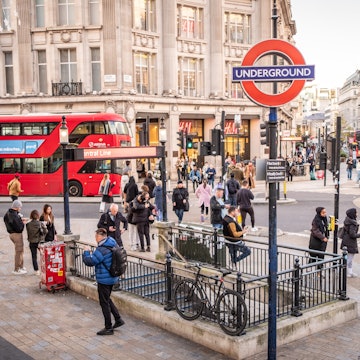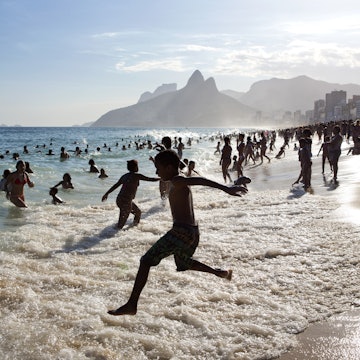
Traditional Paraguayan cuisine goes gourmet at this Asunción restaurant
Dec 6, 2019 • 5 min read

Classic Paraguayan dishes get a gourmet twist at Pakuri © Courtesy of Pakuri
Paraguayan food might not enjoy the international fame of Peruvian ceviche or Argentine asado, but a stylish restaurant in Asunción is determined to put local cuisine on the map. The formula? Time-honored local dishes and a traditional oven in the garden.

At Pakuri, hearty family favorites get a refreshing, contemporary makeover. The restaurant is named after the fruit of the platonia tree, which grows in the humid rainforests of South America. It was the favorite fruit of chef Sofia Pfannl’s grandmother, who grew it on her land and even named her fields after them.
“We felt like there was a gap, people weren’t trying Paraguayan food,” explains sommelier Jose Miguel Burga, who co-owns the restaurant with Pfannl.
The pair were inspired to open their own place while working in a restaurant in New York. Surrounded by international cuisine, they felt Paraguay wasn’t doing enough to promote its local food. Back in Asunción, they opened Pakuri in May 2017.

The first bite
The meal starts with complementary mandioca balls with tomato. Crusty, round chickpea flour sourdough bread are served with miel de caña (a sort of sugarcane “honey”) and butter carefully singed just enough to create a smoky, caramelized flavor. Pfannl is coeliac, so the entire restaurant is gluten-free.
The bread is baked in a traditional Paraguayan wood oven known as a tatakua, which means “hole of fire” in the indigenous language Guaraní. The restaurant’s own tatakua is a giant white sphere in the tropical garden. Taller than a person, it has a small, round metal door that makes it look strangely like a diving bell.
A Paraguayan classic
Also prepared in the tatakua is one of Paraguay’s best-known foods, sopa paraguaya (Paraguayan soup). The name is famously misleading: it’s solid and closer to cornbread than a soup.
There are competing stories about how Paraguay came to have solid soup, according to Pfannl. Some say Paraguay’s first president, Carlos Antonio López, had a cook who accidentally added too much cornflour to a soup. To disguise her mistake, she put the dish in the oven and baked it solid, and the president loved it so much that it became a national favorite.
Others say it comes from a Spanish ensopado of bread soaked in milk, adapted to use corn. Regardless, the sopa paraguaya served at Pakuri is so smooth and creamy you could almost take it for soup if it weren’t for the crispy crust. Pfannl’s special recipe uses polenta, and although some versions use animal fat, Pakuri’s is vegetarian. Paraguayan cuisine is often stodgy, intended to fuel workers heading out for long days in the fields.
“That gets really heavy,” Burga says. “We wanted something lighter and fresher.”
The filled pasta is a great example. Stuffed with crunchy greens and served in a light smoked beetroot sauce with a fruity aroma, it has bite without being chewy. To avoid using wheat, the pasta is made from corn, tapioca and rice flour with corn and tapioca starch. The presentation is simple, but the effect is delicious.

Save room for dessert
If heavy is what you’re after, you’ll find it on the dessert menu. Thick slices of syrupy, candied papaya are served with little cubes of Paraguayan soft cheese, tofu and mature cheese ice cream. If you think cheese ice cream sounds odd, don’t knock it ‘til you’ve tried it: it blends wonderfully with the fruit.
Raise a glass
The drinks menu puts a creative twist on local favorites, too. Caña, a Paraguayan sugar cane spirit, is shaken up with fresh fruit juices and local herbs to create stylish, drinkable signature cocktails.
Burga is especially proud of the “Cocido Ka’ure”. Ka’ure means drunk or tipsy in Guaraní. Cocido is a yerba mate drink prepared by burning a mixture of mate and sugar with hot coals before boiling it up with water, creating a sort of hot, caramel-flavored tea.
At Pakuri, they reduce it to a syrup and serve it with caña, gin and grapefruit. It’s served under a bell jar with some of the smoke from the cocido.
Despite this elaborate preparation, neither caña nor cocido are fancy drinks in Paraguay.
“One day, a client came in and ordered ka’ure and he said, ‘I used to drink this in prison!’” Burga says.
Pakuri’s architecture
Almost as exciting as the food is the building itself. Pakuri is an angular, contemporary structure made from converted shipping containers. Don’t think this is some hipster popup, though: it looks more like an upscale hotel, and after dark you could be forgiven for thinking it was the outlandish home of some contemporary architect.
Pfannl and Burga got the idea from a container hotel they saw in Lima that moved to the beach every summer.
“We were looking at houses but we didn’t know where, and we would have had to refurbish them anyway,” Burga says. “Then Sofia said, ‘Why don’t we do it on empty grounds with shipping containers?’”
Pakuri itself has never been moved, although Burga says that it could, with a little building work.
The decor
Hanging on the walls are paintings by up-and-coming Paraguayan artists. Some are of birds, while others are more obscure, geometric images, but all represent national motifs in some way, according to Burga.
The hard, architectural look is softened out by its setting in a large, lush garden of tropical plants and trees. Dotted along the bar are graceful cuttings in glass vases. The ambiance is wonderful.
As you would expect from a fine dining establishment, this isn’t somewhere to come for cheap eats in Paraguay. One person’s bill for three courses and a soft drink plus tip came to 150,000 Paraguayan guaraníes ($21.88 USD), with cocktails around 35,000-40,000 guaraníes ($5.10-$5.83 USD).
But if you want to try traditional Paraguayan dishes like you’ve never had them before, Pakuri is hard to beat.













